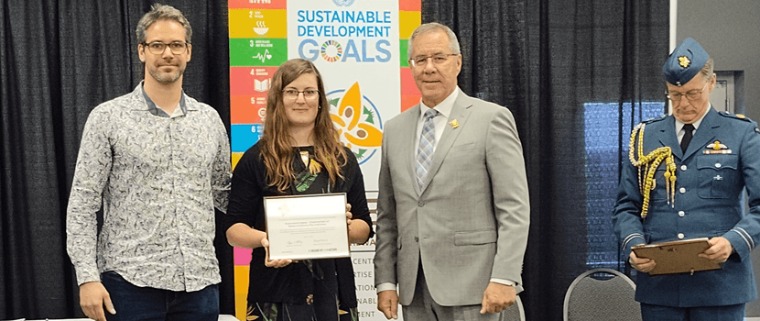
Saskatchewan Polytechnic research associate Volker Schmid and research technologist colleague Keri Sapsford share a passion for composting. The pair were recently rewarded for their efforts to share their knowledge and make it accessible to others through an Education for Sustainable Development recognition award by Saskatchewan’s Regional Centre of Expertise (RCE)—one of only six such organizations in Canada acknowledged by United Nations University aimed at promoting sustainable development through higher education.
Promoting scalable sustainable food waste solutions, the SustainaCuisina applied research project started as a proof-of-concept initiative at Sask Polytech’s Prince Albert campus. With the goal to reduce greenhouse gas emissions from organic waste in landfills, Schmid and Sapsford implemented vermicomposting and in-vessel composting systems in the campus’s food services operation, successfully diverting over 388 kg of food scraps from the city’s landfill over the course of six months. The research team calculated that the amount of greenhouse gas reductions were equivalent to more than 1,000 km of vehicle emissions.
Schmid and Sapsford conducted the applied research under the umbrella of Sask Polytech’s Sustainability-Led Integrated Centres of Excellence. Also known as SLICE, this grouping of applied research centers has a mandate to solve complex sustainability challenges in collaboration with industry and community partners. Working closely with the campus’s food services team, Schmid and Sapsford demonstrated how institutions with industrial-sized kitchens can implement on-site composting systems.
With funding from Colleges and Institutes Canada (CICan), the research team launched the pilot in September, 2023, using red wiggler earthworms to speed up the composting of cafeteria kitchen scraps. “Over 40 per cent of what goes into landfills is organics from food and yard waste,” says Sapsford. “On average, we were able to divert 70 kg of scraps from the landfill each week. That’s a lot of potential waste that, rather than contributing to greenhouse gas, produced rich, organic soil full of nutrients.”
The team collaborated with two other post-secondary institutions, Dawson College in Quebec and Selkirk College in British Columbia, to share outcomes from their composting projects. The Sask Polytech research team also seized the opportunity to collaborate with BrewNature, a pioneering industry partner specializing in innovative in-vessel composting systems. This partnership enabled Sask Polytech to conduct a direct comparative analysis between in-vessel and vermicomposting methodologies, examining their respective processing efficiencies and output volumes.
“We were pleased to engage so many students in the project,” says Schmid. “We had a great turnout of volunteers interested in helping and we expect many more to contribute to the composting operation into the next academic year.” Two student research assistants, Carley Makuch and Xavier Iron-Still, were hired to assist with running the project. “When I saw the posting for the opportunity it seemed like the perfect place to learn,” says Iron-Still, who started composting in his own home kitchen and yard. “The worms eat a surprising amount and it’s been cool to see all that food disappear throughout the Sask Polytech project.”
Schmid and Sapsford created and are promoting a composting toolkit for others considering on-site composting, based on their findings from the Sask Polytech pilot and their discussions with Dawson and Selkirk. The downloadable handbook offers guidance on composting organic matter from commercial kitchens and coffee rooms. It is designed to help assess the needs of a facility and to determine the best composting system for its situation.
“There are many reasons to introduce composting in a commercial kitchen,” explains Schmid. “Composting is a great way to process organics quickly and avoid insect pests or larger animal pest problems, such as bears. It can also help your organization improve its environmental track record or show others you are doing your part to improve sustainability, and it’s the right thing to do.”
The RCE award for Education for Sustainable Development was presented at a recognition event in Yorkton Saskatchewan. Both Schmid and Sapsford attended.
“Congratulations to the SustainaCuisina applied research project team on this recognition by RCE Saskatchewan,” says SLICE director Dr. Robin Smith. “Your project is helping us lead the rise of polytechnic education and will spread the knowledge you gained in the pilot to others through a tangible resource.”
Other than helping to take care of the natural waste produced by kitchens in a way that doesn’t produce methane, on-site composting provides rich, worm casting compost—often referred to as gardener’s gold. In what has become a win-win for Sask Polytech, its community and the environment they share, Prince Albert campus staff and students have been taking home the pre-chewed fruits of the red wigglers’ labour to their own flower and vegetable plots.
To learn more about SLICE research, visit: Sustainability-Led Integrated Centres of Excellence (SLICE) (saskpolytech.ca).

